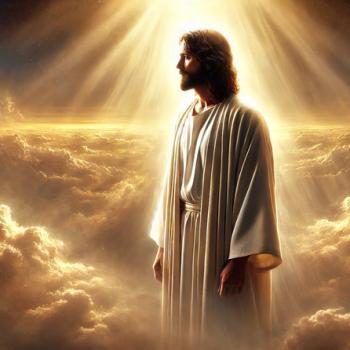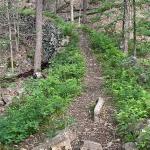The Adventurous Lectionary – The Ninth Sunday after Pentecost – July 21, 2024
2 Samuel 7:1-14a
Psalm 89:20-37
Ephesians 2:11-22
Mark 6:30-34, 53-56
God’s covenant embraces all of us, promising more than we can ask or imagine. How do we best align ourselves with God’s vision of abundant life for us and those we love? How do we open to the sacredness of the present moment and also for the long haul? How do we find peace and healing, calm and contemplation, in a frantic and busy world? Those are some of the questions, this week’s lectionary provokes.
In today’s scripture, God is looking for a home. God is tired of being a wanderer and wants a house to dwell in. While God is universal and unconfined by human buildings or doctrines, certain spots become sacred to us; they are “thin places” where heaven and earth meet and humanity can experience holiness. The passage from Samuel explores the quest for such a sacred spot. The passage explores the nature of God’s covenant with David and his descendants. It affirms that although God travels with us, and is the source of David’s successes, God also seeks a permanent dwelling. God is never abstract, but always concrete and that means God is in this place and we know it!
The locality of God does not to suggest that God is limited to one place, the Jerusalem Temple or our own congregations, but that certain places can be focal points of our faith and of God’s presence. Every religion claims to have holy places where heaven is transparent to human experience. These holy spots suggest that in certain spots there is a greater sense of the holy and quite possibly a greater manifestation of divine energy and inspiration. Samuel sees these as covenantal spots, revelatory of God’s special relationship to certain people, such as David, and nations, such as Israel.
The passage from Samuel begs the questions: Can God choose to be more fully present in some places than others? Is there a synergy between divine call and human response that makes certain times and places unique? What about the rest of the world – is it merely opaque and secular?
Where is your sacred space? Where have you experienced the “thin places” of divine revelation?
It is good to have a Temple for the Holy One. But, is the erection of a temple or any other sacred space a potential impediment to experiencing God in the everyday and domestic moments of life? In locating God primarily in one place, do we freeze God, thus creating the dichotomy of sacred and profane? It is imperative in this rapidly changing time in which more and more people declare themselves as “nones” or “spiritual but not religious” that we do not restrict our faith to our sanctuaries, but create sanctuaries without walls. Wherever we are God is with us, revealing Godself, even if some places more dynamically speak God’s presence to us.
The words of Psalm 89 speak of an eternal covenant with David and his descendants. Despite their waywardness, God will not forsake David’s children. God is faithful even when we are unfaithful. There are consequences to turning away from God, and these include loss and destruction, national upheaval, and economic catastrophe. Yet God will remain faithful over the long haul. Our waywardness is not an impediment to God’s covenantal love. This passage also begs the questions: What is God’s role in the consequences of our waywardness? Are these consequences a matter of divine blessing or punishment, focusing on God’s initiative or primarily a result of our closedness to divine energy? Does God directly punish us or let nature take its course? When we turn away, do we block the fullness of divine power and love and thus lose blessings we might otherwise receive?
The words of Ephesians affirm that in Christ, God has made peace with all peoples, insiders and outsiders alike. Although the laws of Moses have been relativized, the covenant with David has not been nullified. God’s covenant with Israel has been expanded to include all humanity. The law is no longer a dividing line, creating a chasm between the clean and unclean, but has been transformed to inspire and shape all humanity. Ephesians affirms that Christ is our peace, our unity, joining diverse and otherwise divided people into one community of love. Gentiles, representative of the whole earth, are no longer aliens but God’s beloved. There are no aliens anymore; all persons are encompassed by God’s covenant of grace. Does the affirmation “aliens and strangers no longer” pertain to our current political situation? If God has no aliens, should we? While this cannot entirely determine public policy, it certainly shapes our response to undocumented residents, refugees, and aliens on the borderlands? Compassion, not demonization, is demanded among those who have experienced God’s grace?
Mark’s Gospel portrays the interplay of compassion and action in ministry and everyday life. The disciples are so busy doing good works that they barely have time to eat. This is a curious observation by Mark, but I would suggest an important one: the busyness of ministry can lead to burnout. We can wear ourselves out by the tasks of ministry and find ourselves emotionally, spiritually, and relationally drained. Jesus recognizes their needs, and perhaps his own, and gives them time to recover their wholeness. They go on a brief retreat to a deserted place. This retreat may be as much for Jesus as his followers, for the demands of ministry are great and in Mark’s chronology Jesus’ spiritual friend John the Baptist has just been murdered by Herod. Perhaps, Jesus needs to recuperate and regain his own spiritual centeredness in the midst of grief and the demands of ministry. The benefits of retreat for Jesus are obvious. He returns to work with compassion and empathy. His heart goes out to those seeking his care; they are not nuisances but sheep without a shepherd, to be cared for and led to discover their own wholeness.
This passage is directed to our congregants as well as ourselves. Busyness is the name of the came in the 21st century. Some is imposed on us and some is chosen. We scroll incessantly. Phone calls and e-mail are always urgent and demand immediate response. We overbook ourselves with children’s and youth activities and are too tired to make it to church. Finding an hour for confirmation class is a near impossibility!
Our work and Jesus’ work as well is never completed. The work of healing is life-long. In the wake of feeding five thousand, the demands become even greater. The needs are immense and so are the calls for compassion and energy, and peace. Yet, Jesus the healer is with us and when we reach out to him, we receive grace and healing.
This week’s scriptures invite us to awaken to God’s “covenant of wholeness.” God wants us to have abundant life and provides practices to nurture well-being in the midst of our busy lives. Congregants as well as laypeople need to make a commitment to intentional times of retreat on daily, weekly, and monthly basis. The interplay of action and contemplation, work and rest, commitment and retreat, are necessities for busy pastors and parents, retired boomers and active millennials. Pause awhile and know that God is with us. Experience Sabbath.
The “so what” in this passage is the recognition that although the demands of our professional and personal lives will continue, we can find wholeness by remembering to pause and rest and open to God’s sustaining presence. The adventurous pastor needs to develop her or his own spiritual practices and provide guidance and opportunities to congregants. Hurry sickness can be transformed into time spaciousness when we open to “thin places” of God’s everlasting grace and holy infinity.
If you focus on the gospel passage, you may choose to provide an opportunity following worship for congregants to reflect on ways they can find spiritual refreshment. A basic course in contemplative prayer, meditation, or stress reduction would be an appropriate response to the gospel.
(For more on practices of wholeness in ministry that can be translated for lay folk, see Bruce Epperly, A Center in the Cyclone: 21st Century Clergy Self-Care and Tending to the Holy: The Practice of the Presence of God in Ministry; Kirk Byron Jones, Rest in the Storm: Self-Care Strategies for Clergy and Other Caregivers.)
+++
Bruce Epperly is a pastor, professor, and author of over eighty books, “Jesus: Mystic, Healer, and Prophet,” “Process and Politics,” Spirituality, Simplicity, and Service: The Timeless Wisdom of Francis, Clare, and Bonaventure,” and “The Elephant is Running: Process and Open and Relational Theology and Religious Pluralism.” His most recent books are “The God of Tomorrow: Whitehead and Teilhard on Metaphysics, Mysticism, and Mission” and “Head, Heart, and Hands: An Introduction to St. Bonaventure.”














